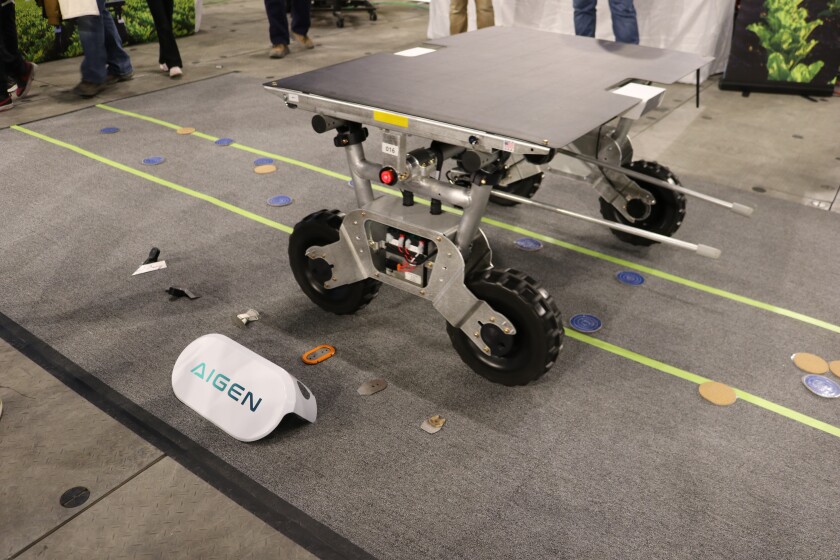GRAND FORKS, N.D. — It’s not every day you get to see a robot that finds and eliminates weeds, all while being powered by the sun. But attendees of the first day of the International Sugar Beet Institute got to see one in action.
ISBI, an annual sugarbeet-focused show that rotates between Grand Forks and Fargo, pulls in sugarbeet growers largely from North Dakota and Minnesota to learn from vendors and speakers. The show kicked off on Wednesday, March 14, at the Alerus Center in Grand Forks and continued on Thursday, March 15.
Jenny Schlecht / Agweek
Among the vendors was
Aigen
, with its four-wheeled, solar-powered robot that will be deployed this summer to eliminate herbicide resistant weeds between Fargo, North Dakota, and Ada, Minnesota. Aigen CEO and founder Kenny Lee said 30 to 40 robots will be deployed in the fields of farmers in that area who have contracted with the company.
On Wednesday, crowds would gather throughout the day and linger to watch the robot. Lee explained that two green strips of tape on the floor simulated sugarbeets in 22-inch rows. A pair of “eyes” on the robots followed those lines to stay on track and alert the robot to go the other direction when it reached the ends of the “rows.” Another set of eyes was pointing down, identifying blue targets tossed between the “rows,” which the robot had been taught to identify as weeds.
“It’s identifying what we’re simulating as weeds with the blue targets. And you’ll see that there’s blue targets, and there’s brown targets. It’s going to miss and ignore all of the brown targets and hit the ones that are blue. And that is using machine learning and AI to enable those type of capabilities,” Lee said.
ADVERTISEMENT
Jenny Schlecht / Agweek
While the robots initially will be looking just for weeds, because “that is the No. 1 problem that all growers have expressed,” Lee said the next goal is to use the robots to identify other problems in fields.
“So imagine being able to detect insects, pests, diseases, nutrient deficiencies. This is the potential of the robotic platform that we’re building,” he said.
Aigen began in Washington but has set up an office in Fargo. Lee does not have a background in agriculture. He is an engineeer, and before starting Aigen, he worked in the cybersecurity industry.
“And within that industry, I always had a goal of protecting people, making the world a better place in the cyberspace,” he said. “But as I was looking around to do something different, what you realize is that agriculture is a pillar of society, and farmers are stewards of the land. And I find no other cause that is as important as this.”
Grand Farm plans for the future
Aigen set up shop in Fargo in part because of the ag tech industry’s presence in the Red River Valley of North Dakota and Minnesota.
“We started scoping out across the United States, of agriculture communities and hubs. And we found the North Dakota-Minnesota region to be one of the strongest that we found,” Lee said. “And so we’re starting our entire business here.”
Part of the infrastructure of the region that attracted Aigen was Grand Farm. Grand Farm has a 140-acre innovation campus just west of Casselton, North Dakota, and is a collaboration of growers, corporations, startups, educators, researchers, government and investors working to solve problems in agriculture through technology and innovation. Grand Farm has been built with
state and federal funds
, as well as considerable
private investment
from ag tech companies.
“The team there is amazing. They’ve been so supportive,” Lee said.
ADVERTISEMENT
Jenny Schlecht / Agweek
William Aderholdt, director of Grand Farm, was the keynote speaker for the first day of ISBI, and in his speech to about 40 growers and industry leaders, he focused on Grand Farm’s work to solve problems in agriculture in ways that make sense on the farm, rather than just testing the possibilities of technology that would be hard to incorporate into a real-world scenario.
“We are putting considerable thought and effort into better understanding how people do their work on a farm — what problems they have and what opportunities they could see come forward, before we even want to propose a solution. Our team is dedicated to better understanding how to bring solutions that make sense for agriculture,” he explained.
Grand Farm gives companies the space to test out solutions in small plots before they ever ask farmers to try new technologies in their fields.
“We want to make sure we can speak for these products,” he said.
Grand Farm has plans for numerous field days and public events. Among them will be the June 10 unveiling of its Innovation Shop, a 25,000-square-foot facility that will be half shop and half meeting space.
Jenny Schlecht is the director of ag content for Agweek and serves as editor of Agweek, Sugarbeet Grower and BeanGrower. She lives on a farm and ranch near Medina, North Dakota, with her husband and two daughters. You can reach her at [email protected] or 701-595-0425.




